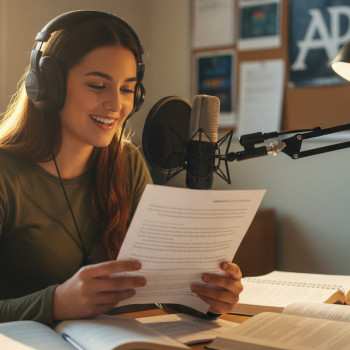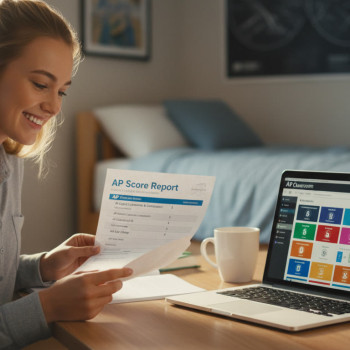Why Students Choose AP Psychology First
It’s mid-July and schedules are out: you have a gap in your junior-year timetable, a neighbor who swears psychology changed her life, and an elective slot that feels dangerously easy to fill with something—anything—labeled AP. AP Psychology whispers a gentle promise: “Fascinating topics, college-credit potential, and no math-heavy labs.” For many students, that promise is irresistible.
But is AP Psychology a strategic first AP—an on-ramp that builds confidence and critical thinking—or a helpful placeholder that looks good on paper but does little to prepare you for the intensity of other AP courses? The short answer is: it depends. The longer answer—what we’ll unpack in this piece—walks through the course content, exam format, realistic workload, ways it fits into a student’s academic trajectory, and practical tips to make the most of it, including how tailored support like Sparkl’s personalized tutoring can help you thrive.
What AP Psychology Actually Is: A Quick Tour
AP Psychology is an introduction to the systematic and scientific study of behavior and mental processes. Rather than being a shallow survey, the modern AP Psychology course has been revised to align with college-level introductory psychology frameworks. It covers five core units—Biological Bases, Cognition, Development and Learning, Social Psychology and Personality, and Mental and Physical Health—mixing theory, research methods, and real-world applications.
Course Structure at a Glance
- Units: Five major units that map to foundational psychology domains.
- Skills: Emphasis on concept application, research methods, data interpretation, and argumentation.
- Assessment: Digital exam with multiple-choice questions and free-response items focused on analysis and evidence-based reasoning.

Smart On-Ramp: Why AP Psychology Can Be a Great First AP
When chosen thoughtfully, AP Psychology can be an excellent introduction to Advanced Placement work. Here’s why.
1. It Builds Analytical Reading and Writing Skills
AP Psychology requires students to read studies, interpret graphs and tables, and write clear, evidence-based explanations—skills that pay dividends in AP U.S. History, AP Biology, AP English, and beyond. The free-response questions emphasize argumentation and applying theory to scenarios, which helps students learn to structure responses under time pressure.
2. It’s Conceptually Engaging and Relatable
Studying memory quirks, social influence, or developmental stages often feels immediately relevant. That emotional engagement encourages consistent study habits—students who enjoy material tend to put in the steady practice AP success requires.
3. Low Barriers to Entry
AP Psychology typically has no strict prerequisites. If you’ve taken basic biology or a social studies class, you’ll find much of the content accessible. This makes it a useful choice for students who want a rigorous course without an intimidating technical background.
4. It Teaches Research Literacy
The course foregrounds research methods and data interpretation. Even early exposure to concepts like experimental design, correlation vs. causation, and ethical considerations helps students think like scholars—an underappreciated foundation for college-level coursework.
Schedule Filler: When AP Psychology Might Not Be the Best First AP
Despite the positives, AP Psychology isn’t automatically the right first AP for every student. Consider these caveats.
1. It’s Not a ‘Light’ AP
There’s a myth that AP Psychology is easy. The revised exam places heavy weight on application, analysis, and research skills. Expect rigorous study and sustained practice—especially with free-response questions that require building arguments and interpreting data.
2. Limited Depth in Quantitative Reasoning
AP Psychology develops data interpretation but doesn’t replace the quantitative rigor of AP Calculus or AP Physics. If your goal is to demonstrate strength in math-heavy fields, choosing psychology as the only AP early in your transcript could under-represent those abilities.
3. Misalignment with Future Plans
If you’re aiming for majors that demand a strong STEM profile—engineering, computer science, natural sciences—admittingly impressing colleges with AP Physics, AP Chemistry, or calculus-based coursework might be more pivotal than a psychology credit.
How AP Psychology Helps in College Admissions and Beyond
Colleges look for rigor, demonstrated interest, and a coherent academic story. AP Psychology can contribute to each of these—but context matters.
Rigor
Taken as part of a balanced AP load, psychology shows you can handle college-level thinking across disciplines. It signals curiosity and academic breadth.
Demonstrated Interest
If your application or intended major ties to human behavior, education, public health, or social sciences, AP Psychology strengthens your narrative. It can also be a hook in essays or interviews when you connect classroom learning to meaningful extracurricular experiences.
College Credit and Placement
Many colleges award credit or placement for strong AP Psychology scores, which can free up time for majors or allow exploration of electives in your first year.
Practical Study Strategies That Work
Success in AP Psychology comes from active, consistent practice rather than cramming. Here are actionable study techniques students should use throughout the year.
1. Use the Unit-By-Unit Approach
Break the course into its five units and set micro-deadlines. When you finish a unit, synthesize key concepts into one-page cheat sheets—term definitions, key studies, and how concepts connect. These are invaluable for review.
2. Practice Data Interpretation
Get comfortable reading graphs, tables, and short study summaries. Practice extracting the research question, design, results, and limitations. This skill often decides close score cutoffs on the exam.
3. Write Evidence-Based Free Responses
Practice with a timer. Focus on clearly stating your thesis, using psychological vocabulary appropriately, and citing evidence from studies or constructs you learned. Spend the last five minutes revising for clarity and mechanics.
4. Active Recall and Spaced Repetition
Use flashcards for terminology (operant conditioning, retroactive interference, etc.) but pair them with scenario-based questions. Spaced repetition ensures terms stick—and that you can apply them.
5. Group Study With Purpose
Short, focused study sessions with peers where you quiz each other, critique free-response answers, or conduct mini mock experiments can be more productive than long, solo sessions.
Sample Weekly Study Plan (During the School Year)
| Day | Activity | Time |
|---|---|---|
| Monday | Read assigned unit section + make one-page summary | 45–60 min |
| Tuesday | Flashcard review (key terms) + practice MCQs | 30–45 min |
| Wednesday | Data interpretation practice (graphs/charts) | 30 min |
| Thursday | Free-response writing practice (timed) | 40–60 min |
| Friday | Group review or tutor session to go over difficult problems | 45–60 min |
| Weekend | Full-length practice set every other weekend + reflection | 90–120 min |
How to Tell if AP Psychology Is Right for You
Ask yourself some candid questions. The answers will help determine whether AP Psychology is an on-ramp or a schedule filler.
- Do I enjoy reading about behavior, experiments, and real-world applications of theory?
- Am I willing to write clear, evidence-based answers and practice timed free responses?
- Is my goal to demonstrate academic breadth rather than focus on heavy quantitative skills?
- Do I have reliable time to study consistently across the school year?
If you answered yes to most of these, AP Psychology can be a strong first AP choice. If you answered no—especially to the willingness-to-practice question—it may be wise to rethink your plan.
Common Misconceptions and Reality Checks
Misconception: “AP Psychology is easy and guarantees an A.”
Reality: The course is accessible but rigorous. Success requires sustained study and familiarity with scientific reasoning and data analysis.
Misconception: “You don’t need to write much for AP Psychology.”
Reality: Free-response questions demand clear, evidence-based writing and often hinge on your ability to interpret and critique research designs.
Misconception: “It won’t help my college application unless I want to major in psychology.”
Reality: AP Psychology shows intellectual curiosity and critical reasoning skills that admissions officers value across many majors.
Real Student Stories: Two Paths
Stories help illustrate how AP Psychology plays out in real schedules.
Student A: The Confidence Builder
Alice, a rising sophomore, took AP Psychology as her first AP because she loved reading about human behavior. The course taught her how to write structured arguments and analyze graphs, which improved her performance in AP English and AP Human Geography later. She used Sparkl’s personalized tutoring for targeted FRQ practice—short, focused 1-on-1 sessions that identified repetitive weaknesses (like unclear thesis statements) and built a tailored study plan. By junior year she carried an AP-ready study rhythm and felt confident taking a second AP.
Student B: The Schedule Filler
Marcus, a student aiming for engineering, signed up for AP Psychology because it fit his timetable. He treated it as light homework and rarely practiced timed writing. When exam season arrived, he struggled with FRQs and data-interpretation items. His score was lower than expected, and although it didn’t derail admissions, it was a missed opportunity to demonstrate academic discipline. Marcus later used targeted tutoring to boost scores in math-based APs but wished he had treated his first AP with more seriousness.
When to Get Extra Help — And How Sparkl’s Personalized Tutoring Fits In
No one expects students to master everything alone. Smart use of tutoring can transform an elective into a strategic advantage. If you find yourself stalled on free responses, confused by research methods, or unsure how to build a study cadence, that’s an ideal moment to get help.
What Effective Tutoring Should Offer
- 1-on-1 guidance that targets your unique gaps rather than generic drills.
- Tailored study plans that fit your week and build incremental progress.
- Expert tutors who can model FRQ structure and coach on precision of language and evidence use.
- Data-driven insights into performance trends so you practice the right things, not more of the wrong things.
Sparkl’s personalized tutoring blends these elements: one-on-one sessions to refine writing and analysis, customized study plans that scaffold unit learning, and AI-driven insights to prioritize weaknesses. For many students—especially those who want to use AP Psychology as an on-ramp—this kind of targeted support accelerates learning and reduces wasted hours on ineffective strategies.

Exam Day Realities and Test-Taking Tactics
On exam day, preparation meets execution. The AP Psychology exam includes a substantial multiple-choice section and free-response tasks that reward clarity, application, and evidence. Here are practical tips to optimize performance.
Multiple-Choice Strategy
- Answer easy questions first to secure points and build momentum.
- Use process of elimination for harder items; often two choices can be dismissed quickly.
- For data items, annotate the prompt: identify variables, sample size, and the direction of effects before answering.
Free-Response Strategy
- Spend 2–4 minutes planning: outline the thesis, evidence, and how you’ll link concepts to the prompt.
- Use psychological terminology accurately but sparingly—clarity beats jargon.
- Always connect claims to evidence or study design; a single referenced study boosts credibility.
- Leave 3–5 minutes to proofread and sharpen wording.
Balancing Your AP Load: Where Psychology Fits
AP Psychology integrates best into a balanced AP schedule. If you pair it with a rigorous math or science AP, it shows breadth without overloading similar skill sets. Many students use psychology to diversify their transcript—especially if other APs are clustered in STEM or humanities.
Sample Balanced AP Schedules
- Humanities-Heavy: AP English, AP U.S. History, AP Psychology — demonstrates critical thinking and writing across contexts.
- STEM-Heavy: AP Calculus, AP Physics, AP Psychology — shows quantitative strength plus social science breadth.
- Mixed: AP Biology, AP Spanish, AP Psychology — combines language, lab science, and social science.
Final Verdict: On-Ramp, If You Treat It Like One
AP Psychology can be a smart first AP if you approach it deliberately. Its strengths—engaging content, emphasis on research literacy, and transferable writing skills—make it an excellent course for building academic routines. But treating it as a lightweight schedule filler is a missed opportunity. The deciding factor is how you engage with the course: steady practice, active interpretation of research, timed writing, and, when helpful, targeted tutoring.
Practical Next Steps
- Talk with your counselor about balancing your AP load in the context of your college goals.
- Review the AP Psychology unit list and the exam structure so expectations are clear.
- Create a tentative study calendar and commit to weekly practice that includes timed FRQs and data interpretation.
- If you struggle with writing or applying research concepts, consider targeted help—Sparkl’s 1-on-1 guidance and tailored study plans can be a practical way to shore up weaknesses and build confidence.
Parting Thoughts: Curiosity, Commitment, and Confidence
Choosing AP Psychology as your first AP is less about the course’s label and more about how you use it. If curiosity draws you in and commitment keeps you going—if you’re ready to practice argumentation, analyze data, and write with evidence—AP Psychology will earn its place as a genuine on-ramp to more advanced study. If you’re picking it merely to fill a slot, take a breath: restructure your plan so each course nudges you toward your future goals.
In the end, the real advantage is not a course name on your transcript but the skills you cultivate: steady study habits, the ability to interpret research, and clear, evidence-based writing. Those skills travel everywhere—through college, careers, and life. And if you want an experienced guide along the way, remember that personalized tutoring and targeted support can turn a curious elective into a springboard. Good luck—may your curiosity lead to confidence, and your first AP be the beginning of something you build on, not something you check off.

















No Comments
Leave a comment Cancel